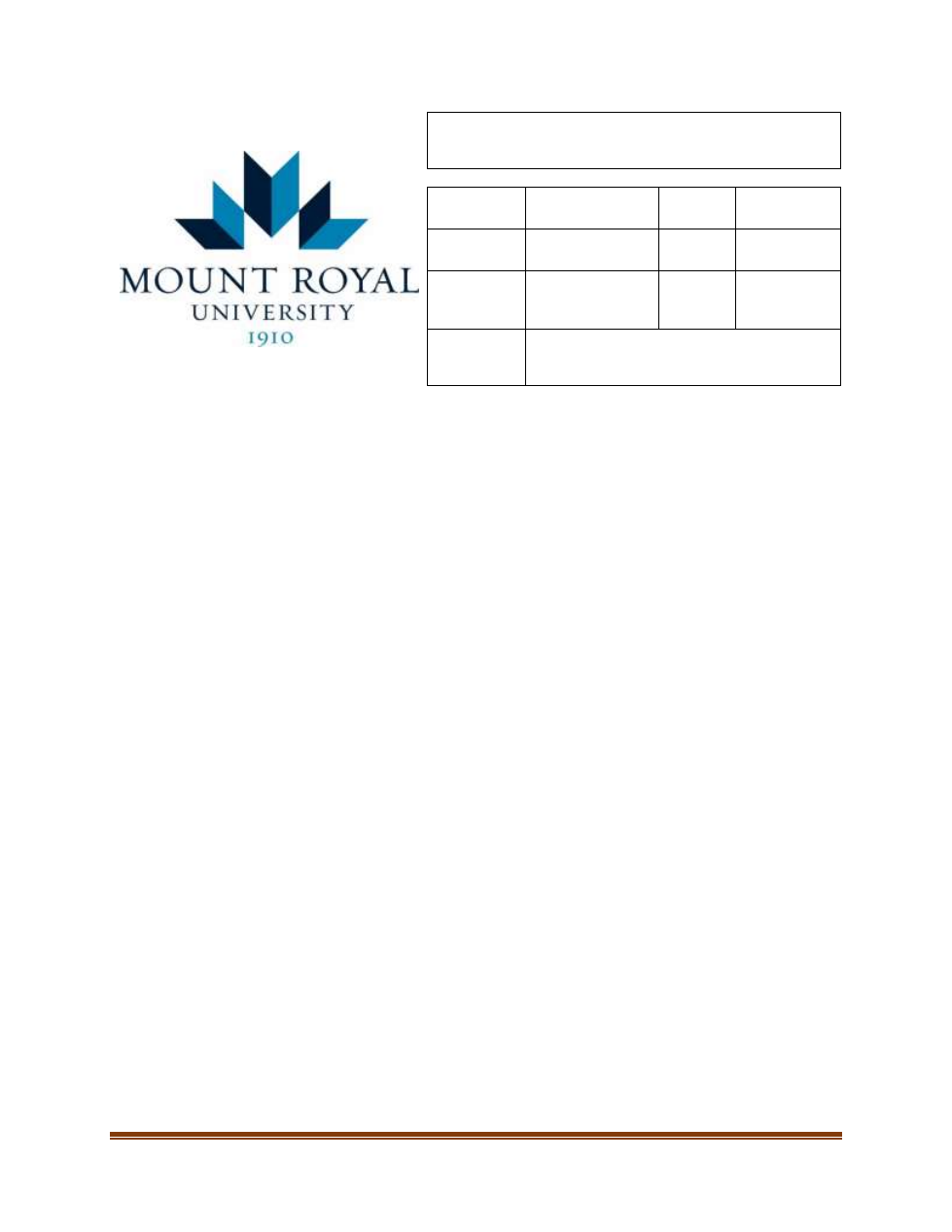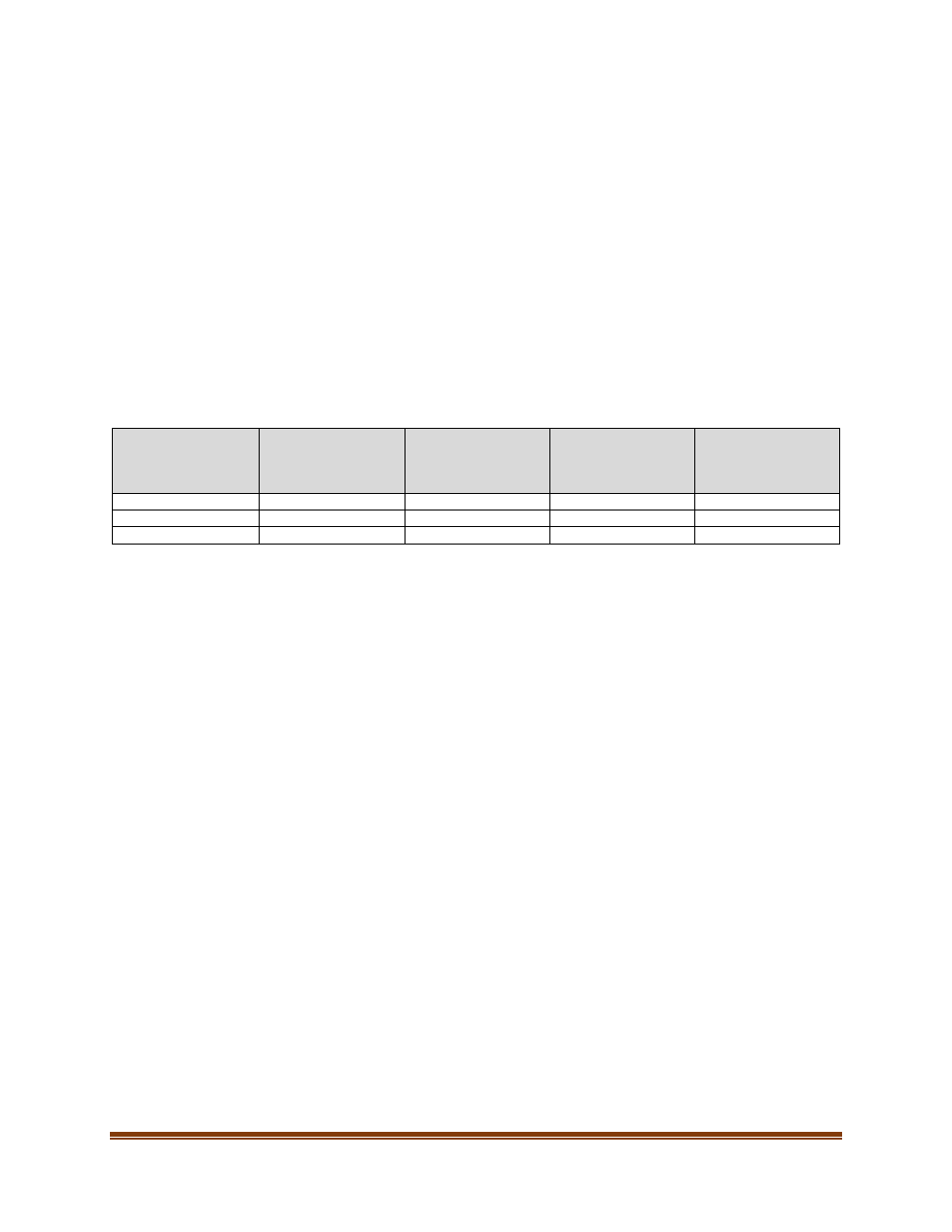
Intellectual Property Procedures – April 13, 2010
Page 1 of 8
INTELLECTUAL
PROPERTY PROCEDURES
Procedure
Type:
Management
Initially
Approved:
April 13, 2010
Procedure
Sponsor:
Provost and VP,
Academic
Last
Revised:
April 13, 2010
Administrative
Responsibility:
AVP, Research,
Scholarship and
Community
Engagement
Review
Scheduled:
April 2025
Approver:
Executive Leadership Team
A.
PROCEDURES
1.
RESPONSIBILITIES
1.1
A cornerstone of Mount Royal’s definition of scholarly activity is that researchers
have an obligation to ensure that research and scholarship results are subject to
peer-review: typically through the process of publication or through public
dissemination.
1.2
This is particularly important in terms of contracted activities, where restrictions on
publication may contradict this basic tenet.
1.3
This responsibility for publication or public dissemination is shared by all material
Contributors to the work.
1.4
In reporting research results, all Creators of a publication must examine and accept
responsibility for its contents, and all members of a research team must ensure
that appropriate credit be given for the contributions of all Contributors. For
additional information, refer to the Integrity in Research and Scholarship policy.
1.5
If and when activities related to the commercialization of Intellectual Property
covered in the Policy on Intellectual Property being: Members have a responsibility
to inform Research Services of the activity. In the case of where Specialized
University Resources have been used, this disclosure will be necessary to
determine the appropriate revenue sharing agreement as detailed in the policy on
Commercialization of Intellectual Property.
2.
RECOGNITION
2.1
Creators of a publication comprise all those individuals who have made a
significant intellectual or scholarly contribution to the work reported, and without
whose contribution the work would not be complete.
2.2
All Contributors to research projects and other scholarly works must receive
appropriate recognition for their contributions.
2.3
The order of listing of Contributors should follow existing traditions of the discipline.

Intellectual Property Procedures – April 13, 2010
Page 2 of 8
2.4
No decisions concerning the publication or licensing of a work may be made
without the agreement of all the Creators.
2.5
Depending on the nature of a contribution, appropriate recognition may take the
form of, but is not limited to, recognition as a Creator, or recognition through an
acknowledgement or citation.
2.6
An administrative relationship to the Contributors does not merit credit, nor is
financial support sufficient on its own to merit such credit.
3.
ACKNOWLEDGEMENT OF MOUNT ROYAL UNIVERSITY
In reporting their work, Academic Members shall acknowledge Mount Royal University for
the support it provided. In the spirit of collegiality, Creators of Intellectual Property are
encouraged to recognize financial or other contributions of the University.
4.
USE OF MOUNT ROYAL'S REGISTERED NAMES, LOGOS AND MARKS
4.1
The University has control over the use of its name and marks and has the right to
approve or disapprove of any use of its name, insignia or other University-owned
marks. This requirement is especially important in the context of non-University
sponsored Commercialization of Intellectual Property.
4.2
Under no circumstances may the University be presented, directly or indirectly, as
creating, endorsing or warranting a particular product. Accordingly, any use of the
University's name or any University-owned mark in connection with any product,
service, research project or work, apart from indication of the institutional affiliation
of the Creator(s) and acknowledgement of support, requires explicit written
permission from University Advancement.
4.3
For additional information on the use of the University's marks, please refer to the
Graphic Guidelines, which can be found on the University website.
5.
THIRD-PARTY RIGHTS
5.1
Mount Royal Members are expected to respect third-party Intellectual Property
rights. This obligation precludes the unauthorized use, reproduction, modification,
translation or adaptation of software, photocopied textbooks, and the like, unless
permission has been obtained from the copyright holder.
5.2
For additional information, please refer to the Integrity in Research and
Scholarship policy and the Copyright Compliance policy.
6.
COLLABORATIVE RESEARCH
6.1
The University encourages researchers to share information and to work in
collaboration with others, where this is likely to advance the state of teaching
excellence or of knowledge.
6.2
Collaboration agreements between Academic Members and researchers at
outside institutions, agencies, and companies must specify, in advance and in
writing, how the process by which the rights to Intellectual Property arising out of
the collaboration will be determined.

Intellectual Property Procedures – April 13, 2010
Page 3 of 8
6.3
The determination of rights shall be based on the extent and nature of the
contribution, and not on differences in power or rank.
6.4
The rights of students involved in research projects, particularly with respect to
recognition and the assignment of grades, must be protected.
6.5
Where University facilities and/or funds administered by Mount Royal are involved
the University must be a party to the agreement.
6.6
Any waiver or modification of rights requires informed consent.
7.
PATENTS
7.1
The general principles regarding patent rights in inventions created by Mount
Royal Members are stated in Article D of the parent policy on Intellectual Property.
7.2
In addition to the provisions of Article D, the Creator(s) shall keep the University
informed about all patent filings in Canada and other countries through annual
activity reports or other appropriate means.
8.
DATA AND DATABASE MANAGEMENT
8.1
This Policy is concerned with the ownership of, and the right to use, original data
collected or measured in the course of teaching, academic and research activities
involving Members. It is not concerned with data from external sources used in
research, other than to assert the obligation that publications or theses using such
data must recognize and fully document their sources.
8.2
Ownership of data assembled by Members in the course of their research shall
normally be held by the Creator(s), subject to Article D of the parent policy on
Intellectual Property.
8.3
Members have the obligation to protect and preserve, for a reasonable period
(defined by the norms of the discipline), and to make available to other scholars
and non-commercial users, the data on which their published work is based.
8.4
The University has the obligation to provide the resources to make such data
available. For more information see the MRU policy on Integrity in Research and
Scholarship.
8.5
Exceptions to these rules are allowed only when the research is subject to
confidentiality requirements due to contractual arrangements with a sponsoring
agency, to publication delays associated with patent applications, or to ethics
constraints on research involving human subjects or animals which are contained
in the University’s ethics policies.
8.6
In the case of contractual limitations, all collaborators must be made aware of,
and agree in advance to, such constraints.
9.
CONTRACT RESEARCH
9.1
Externally-sponsored or contract research activities should involve a legal
agreement between Mount Royal and an external agency. As such, no Mount
Royal Member, other than those designated by the Board of Governors, may sign
such an agreement.

Intellectual Property Procedures – April 13, 2010
Page 4 of 8
9.2
Contract negotiation must involve consultation with the Office of the Associate
Vice-President Research, Scholarship and Community Engagement who may
refer the matter to legal or contract specialists. For more details see the University
policy on research agreements.
9.3
In externally-sponsored or contract research activities, ownership of Intellectual
Property may be determined in whole or in part by the regulations of the sponsor,
or by the terms of the contract.
9.4
Consistent with the University’s policies on research, Academic Members must
retain the right to publish their work within a reasonable period, and to use the
results of the research in subsequent projects, recognising the limitations that may
derive from proprietary data, and must adhere to the academic and professional
standards of their disciplines.
9.5
Academic Members must also not give up their rights to academic freedom,
including the right to independent critique of the subject of their inquiry.
9.6
All Academic Members participating in such research activities must be made
aware of any ownership stipulations of the contract by the principal investigator, or
by any other designated leader of the research project.
9.7
Academic Members entering into a relationship that will limit their enjoyment of
normal academic benefits of their research must enter into it with informed
consent.
9.8
In situations where companies or agencies that fund research retain ownership of
Intellectual Property generated by that research, some other academic benefit
must be derived. That is, the research must support the generation and
dissemination of knowledge in some other way (for example, by funding student
assistants or laboratories that directly support other research).
9.9
Whether any agreement for sponsored research will result in academic benefit to
the Member(s) and the University will be decided by the Associate Vice-President,
Research, Scholarship and Community Engagement in consultation with The
Research and Scholarship Advisory Committee, the Member(s) and the
appropriate Dean as part of the contract review.
9.10
It is the responsibility of Academic Members to ensure that the terms of their
consulting agreements with third parties, which must have the approval of the
appropriate University signing authority, do not conflict with their commitments to
the University.
9.11
Each Academic Member must make the nature of her/his obligations to the
University clear to any third party for whom she/he expects to consult.
10.
CONFIDENTIAL DISCLOSURE AGREEMENTS
10.1
A Confidential Disclosure Agreement [CDA], sometimes referred to as a secrecy,
confidentiality or non-disclosure agreement, is used when one party wishes to
disclose confidential information to a second party, but wishes the second party to
maintain the confidentiality of the information. Non-disclosure provisions can either
stand alone as a separate agreement or be incorporated into a broader agreement.
10.2
In the event that a corporate sponsor wishes Members to use confidential
information, or that Members wish to disclose confidential information, such as a

Intellectual Property Procedures – April 13, 2010
Page 5 of 8
patent application, to a third party, a CDA must be entered into to protect both
parties.
10.3
All CDAs must be submitted to the Office of Research Services for review. If the
terms of a CDA extend to other participants in a project or activity, it is the
responsibility of the principal investigator to inform all participants of their
obligations under the CDA and, if necessary, to develop CDAs for them.
11.
MATERIAL TRANSFER AGREEMENTS
11.1
Materials, for example biological materials, are often distributed by scientists to
their colleagues for a variety of purposes, such as duplication and confirmation of
experimental results or evaluation of the material for alternate uses. Such
Intellectual Property is an important factor in attracting research funding. For this
reason, the University will help Academic Members review Material Transfer
Agreements [MTAs] and other agreements that arise out of their interaction with
industry.
11.2
Because MTAs often contain restrictions on Intellectual Property and publication,
all MTAs must be submitted to the Office of Research Services for review. All such
agreements must be approved by the Associate Vice-President, Research,
Scholarship and Community Engagement who shall consult with the Risk
Management Office, and must be signed by the appropriate institutional authority.
11.3
In all cases, the University requires researchers to sign an MTA to ensure that
these materials are used only for scientific research and not for commercial
applications.
11.4
If the material is being transferred for commercial application, its use shall be
governed by a license agreement.
11.5
Academic Members must enter into an MTA prior to distributing or receiving any
such materials.
11.6
If the terms and conditions of the MTA are unacceptable to the University, the
Associate Vice-President, Research, Scholarship and Community Engagement in
consultation with the researcher, will attempt to negotiate other terms acceptable
to all parties.
12.
DISPUTE RESOLUTION
12.1
The University recognizes that disputes may arise between the University and
University Members with respect to Intellectual Property and the implementation
of these procedures.
12.2
With respect to provisions of these procedures also referenced in the Collective
Agreements, the dispute resolution mechanisms outlined there shall take
precedence.
12.3
In all other cases, where an agreement cannot be reached between the
University's Associate Vice-President, Research, Scholarship and Community
Engagement and the Creator, any party to the dispute may request that the matter
be referred to the Provost and Vice-President, Academic.
12.4
The decision of the Provost and Vice-President, Academic shall be final.

Intellectual Property Procedures – April 13, 2010
Page 6 of 8
13.
EXCEPTIONS AND PERMISSIONS
13.1
Where waivers, permissions or exceptions are referenced in this document, the
parties responsible for decisions are, for major policy exceptions - the Research
and Scholarship Advisory Committee (RSAC), acting on the authority of General
Faculties Council or, in the case of minor exceptions or negotiations – the
Associate Vice-President Research, Scholarship and Community Engagement.
14.
FURTHER INFORMATION
14.1
These procedures are not intended to provide a general explanation of the legal
principles and practical implications associated with intellectual property. For a
general explanation, please refer to Intellectual Property Guidelines available from
the Office of Research Services.
B.
DEFINITIONS
In this procedures document the following terms, when capitalized, shall have the following
meanings:
(1)
Academic Members:
shall include full-time and part-time instructors teaching credit
courses, any other person teaching a credit course,
counsellors, educational developers, librarians, those
persons from time to time designated “Academic Members”
by the Board, and any other person teaching non-credit
courses. It shall also include teaching assistants, post-
doctoral fellows, research fellows, undergraduates and other
students.
(2)
Board/Board of
Governors:
means the Board of Governors of Mount Royal University
(3)
Commercialization:
shall mean activities undertaken in order to commercially
exploit Intellectual Property. Commercialization includes sale,
assignment or licensing of IP or manufacturing or production
of goods and/or Services using Intellectual Property as well
as protection of IP, with the goal of financial return
(4)
Contributor:
shall mean an individual or organization that contributes to a
work. Possible contributions include, but are not limited to
ideas, expression, form, design, computer software and
criticism.
(5)
Creator:
shall mean the person or persons who create Intellectual
Property
(6)
Intellectual Property or
IP:
shall mean any result of intellectual or artistic activity created
by a person, that can be owned by that person including but
not limited to: Works, data, inventions, ideas, patents, patent
applications, industrial designs, trade-marks, trade names,
domain names, integrated circuit topographies, plant
varieties, computer programs, circuits, biological material,
chemical or other compositions of matter, know-how,

Intellectual Property Procedures – April 13, 2010
Page 7 of 8
confidential information and trade secrets, which can be
registered or otherwise protected under the law.
(7)
Mount Royal Members
or Members:
shall include both Academic and Non-Academic Members
(8)
Non-Academic
Members:
shall include full-time and part-time administrative,
professional, support staff and other persons paid by or
through the University and anyone working under University
auspices
(9)
Policy:
means the Intellectual Property Policy
(10) Specialized University
Resources:
shall mean University Resources that would not normally be
utilized by the individual in the normal course of duties and
would require University funding either directly or indirectly.
Examples include, but are not limited to, MRU funded grants
for the project in excess of $10,000, scientific instrumentation,
specialized library resources or personnel, additional
teaching release for faculty, or the use of research labs.
External funding may be included, depending on the nature
of the contract, awards agreement, or funding agency policy.
Examples of resources that do not apply include the portion
of a standard faculty workload dedicated to research, use of
an office computer, or hiring research assistants using grant
funds. The determination of what constitutes Specialized
University Resources in a particular context shall be made, in
writing, at the outset of commercialization activities, and
signed by the Creator and the Dean/Director of the relevant
Faculty/Unit. Otherwise, the Dean/Director shall make the
determination. Such a determination is subject to the dispute
resolution process set out in the Intellectual Property
Procedures.
(11) University:
means Mount Royal University
(12) University Resources: shall include the use of University funds, University staff,
facilities, equipment, materials, technological information, or
proprietary know-how.
C.
RELATED POLICIES
•
Commercialization of Intellectual Property Policy
•
Integrity in Research and Scholarship Policy
D.
RELATED LEGISLATION
•
Copyright Act (Canada)
E.
RELATED DOCUMENTS

Intellectual Property Procedures – April 13, 2010
Page 8 of 8
•
Collective Agreement between the Board of Governors of Mount Royal University and the
Mount Royal Faculty Association
•
Commercialization of Intellectual Property Procedures
•
Confidential Disclosure Agreement
•
Integrity in Research and Scholarship Procedures
•
Integrity in Research and Scholarship: Collection, Storage and Authenticity of Data
Procedures
•
Intellectual Property Guidelines (Office of Research Services)
•
Material Transfer Agreements
•
Mount Royal Copyright Contract
•
Mount Royal University Graphic Guidelines
F.
REVISION HISTORY
Date
(mm/dd/yyyy)
Description of
Change
Sections
Person who
Entered Revision
(Position Title)
Person who
Authorized
Revision
(Position Title)
04/13/2010
NEW
06282021
Editorial
Title Update
University Secretary University Secretary







